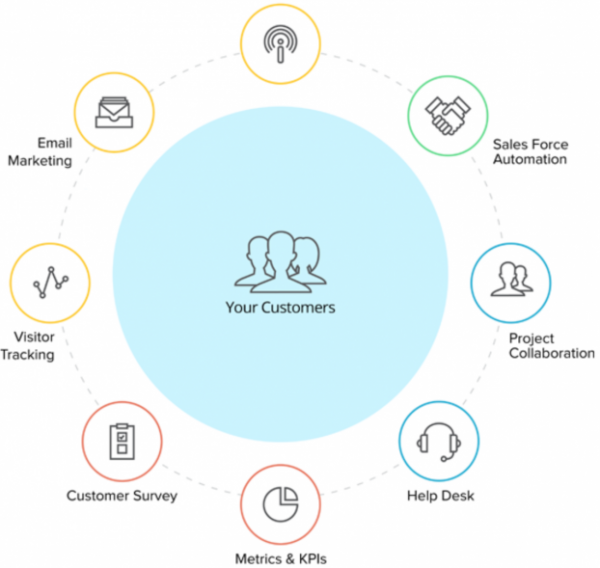Essential Project Managements Skills for Every Entrepreneur
Not all project managers are entrepreneurs. Yet all entrepreneurs need to be project managers.
The truth is everyone’s a project manager.
As this post over at Wrike explains — every time you work on something that takes more than one step, you are managing a project. It could be as massive as developing a new product spanning months of research and testing or as brief as organizing dinner with friends on a weekend.

From Idea to Execution
Entrepreneurs often begin with an idea. The challenge lies in translating this idea into a profitable product or service.
This is where project management enters the picture.
An entrepreneur without solid knowledge of essential project management skills is less likely to arrive from Point A (idea) to Point B (execution) than the entrepreneur who has taken the time to learn and apply the basics of project management best practices.
Below is a list of project management skills that every entrepreneur should immerse themselves in for 2016!
1. Realistic Goal Setting

It’s easy for entrepreneurs to get caught up with their latest idea. But not all ideas are good ones.
To help entrepreneurs identify workable ideas from the not-so-practical ones, realistic goal setting through a sound project management plan is a must. It also helps in keeping sloppy execution from happening.
According to this definition, a project management plan is:
In hindsight, realistic goal setting as a project management skill empowers entrepreneurs to tame and refine wild (and sometimes unrealistic) ideas.
2. Task Management

The best project managers are adept in turning a seemingly herculean project into manageable chunks of tasks. As an entrepreneur, you should be able to replicate this skill.
Creating workflows and prioritizing what needs to be done for a smooth project flow falls under task management.
For example, consider the solopreneur who is about to launch her first product online. Before the big launch, there’s social media marketing to be taken cared of. And the website’s not even finished yet! Not to mention that the outsourced designer who’s in charge of product packaging just sent an email that she might not hit the deadline because she’s bedridden with the flu.
If you’re in the same boat as the solopreneur above, knowledge of different task management tools such as Asana and Trello will come in handy. Setting realistic deadlines and calculating timeframes is also a must-have skill for every entrepreneur’s task management tool box.
3. Risk Assessment and Management

What if things don’t go as planned?
Say you run a flower and gift shop. You know there’s going to be a skyrocketing demand for flowers and all things crafty a day or two before February 14. But what if two of your three suppliers suddenly informed you two days before V-day that they can’t fulfill your orders for those lovely lilies (which unfortunately is the most sought out). So now what?
This is why proactive preparation is a must for businesses of all shapes and sizes.
Take note that a risk is way different from an issue. Issues are events that you know you’re going to eventually deal with while risks are most likely to happen but you don’t have an inkling when.
In the flower shop example, the skyrocketing demand is an issue while your suppliers suddenly bailing out on you is a risk.
As an entrepreneur, a keen sense of the following components of risk assessment and management is critical:
- Event: What is likely to happen?
- Timeframe: When is the event likely to happen?
- Impact: What’s the possible outcome of the event?
- Probability: What are the chances of the event happening?
- Factors: What things or situations are more likely to precede or trigger the event?
By answering the questions above, entrepreneurs can sharpen their risk management skills by identifying threats, risk probability, and possible countermeasures. The SWOT analysis model is one great tool for risk assessment.
4. Knowledge of Different Project Management Methodologies

You’ve probably heard about Lean, Agile, Kanban or Scrum and asked yourself where did all those one-word wonders came from.
All of these are project management methodologies. If you google “how many project management methodologies are out there”, you’ll most likely find 5, 8, or 10.
The best project managers understand that there is no one-size-fits-all approach when it comes to project methodologies. For entrepreneurs to scale their business in the Internet of Things era, the ability to pick the right methodology based on current constraints, timeline, and resources is crucial. You can learn this by reading about these methodologies and finding ways to apply what you’ve learned with real projects.
Think of it as cooking the best home cooked fried chicken. Each home cook has his own version, different set of ingredients, proportions, and steps to get the recipe done. Yet the end result is the same — crispy and juicy fried chicken!
It’s the same thing with project management methodologies. Each methodology may be different in its approach but the goal is always getting the job done.
The Takeaway
Entrepreneurs wear many hats — from marketing to accounting to project management. While it can be overwhelming at first, learning the tools and tricks of project management begins by being aware of the reasons why you should learn them in the first place. What you are trying to accomplish?
It’s like loving yourself first before committing to a relationship (excuse the love metaphors, it’s February!).
Not sure where to start in honing your inner project manager? The Founders’ Guide team can show you how!
